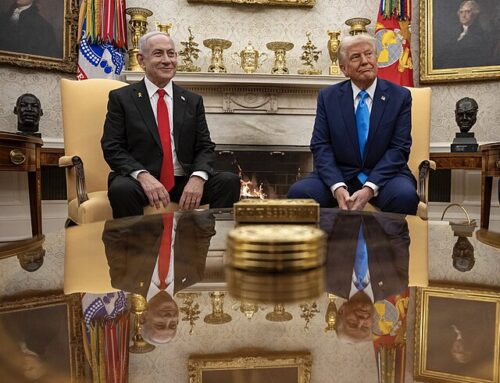An Open Letter to Palestinians: You Can Break This Cycle
By Gershon Baskin
(Originally published in the Times of Israel. Reprinted here with permission of the author)
This is an open letter to Palestinian readers. I already know I will be passionately attacked and criticized by many Palestinians for what I am writing. I have been engaged in bridging between Israelis and Palestinians for 46 years and believe me I have heard it all. I remain dedicated to the basic principle that peace can be made between the two peoples who live on the land between the River and the Sea.
Throughout all of these years, Israelis have spoken mostly about peace, while Palestinians have spoken mostly about ending the occupation and achieving freedom, equality, and dignity. Israelis and Palestinians don’t speak on the same frequencies and, of course, there is no symmetry between them. Israel is a strong state in existence for 76 years that is recognized by 165 countries and that maintains economic and security ties with even more. Israel is a challenged democracy but, at least so far, it is still a democracy.
Palestine, which Israel occupies with a harsh military occupation, is not a fully recognized state and has had a divided political leadership for 17 years. Palestine has a weak economy largely limited by Israeli restrictions. Palestinian lands are confiscated by Israel to build illegal settlements. Thousands of Palestinians are imprisoned in Israeli jails. Palestine lacks democracy and has no accountable government. To put it bluntly, Israel is strong, Palestine is weak.
Throughout the 46 years that I have been working across the conflict lines, I have heard from Palestinians that because Israel is the occupier and because Israel is strong, it needs to take the first step toward the Palestinians. This argument would be valid in a world where everything that happens is based on what is just. But that’s not how the world has ever worked and I would wager that it will never work that way – especially after October 7.
The Gaza War is the worst of all of the Israeli-Palestinian wars: More people have suffered, been killed, and had their homes destroyed than ever before. This war must be the last Israeli-Palestinian war. We cannot allow this conflict to continue. I fully recognize that there are now more justified reasons to hate the other side than ever before. Supporters of peace on both sides are at a new low point and there are almost no leaders in Israel or Palestine who dare to speak about peace, or ending the occupation or any kind of positive future. In fact, there are almost no people on both sides that I would even call leaders.
Change happens when new voices appear and break the sound barrier by saying things that have not been said in the past. Nelson Mandela cracked the core of Apartheid by stating that he was not seeking revenge, that in the new South Africa whites and blacks would live together with security and dignity. Mandela was victorious because he did not see the white South Africans as his enemy. He understood that the fear inside of white South Africans was the enemy and that to beat that fear he had to speak to the inner heart of white South Africans.
The same is true here in Palestine/Israel. Israelis know there are 7 million Palestinians living on the land. They know the Palestinian people are not going to leave (notwithstanding Jewish Israeli extremists, some of them in the government, who have plans for this to happen). The overwhelming number of Israelis feel trapped in a reality that they do not want. Israelis don’t want to live in fear of their Palestinian neighbors. But October 7 increased their fear, with good reason, to heights that make the notion of ever living in peace seem like science fiction.
Any reasonable Israeli knows that Palestinians have hard lives. Many of them know that Israel is a major cause of the hard lives that Palestinians live. Many may even recognize that the root cause of our terrible reality is the occupation. But very few Israelis believe that Palestinians are truly prepared to live in peace next to Israel. Most Israelis truly believe that the ultimate goal of all Palestinians, not only Hamas, is to destroy Israel. When Israelis are willing to listen to Palestinians, what they hear more often than not is the narrative of victimhood. They also hear from Palestinians that Israel is the victimizer. At the same time, Israelis feel themselves to be the victims and that Palestinians who sanctify death, not life, are the victimizers. The victimhood competition is fierce and ongoing. This common narrative has been in play for more than 76 years and its only achievement has been to maintain and escalate the conflict.
How are we going to break this horrible cycle? I believe the breakthrough will be made by coherent, rational, and compelling Palestinian voices speaking peace. Again, in an ideal world, it should come from the stronger side, but we don’t live in such a world. I know some Palestinians who speak out unreservedly, accepting a measure of responsibility for Hamas’s atrocities on October 7, which were done in their name too, and denouncing the death and destruction Hamas perpetrated on that horrible day. They speak about moral red lines that have been crossed and they remind Israelis that Israel has also crossed too many moral red lines in this conflict.
They say to Israelis that they as Muslims have to recognize that Jews have always been in this land and that Jewish history, memory, and religion are attached to this land between the River and the Sea. But they also remind the Israelis that Jews were never here alone – there were always others living in the land and today those others are the Palestinians. With courage and honesty, these people say that Palestinians have never had the leadership they need, that for the past 100 years, they’ve had three unworthy leaders, Hajj Amin al Husseini, Yasser Arafat, and Mahmoud Abbas, all of whom failed to bring independence, peace and dignity. They say they need new, younger leadership that is not corrupt, believes in democracy and freedom, and speaks the language of peace.
I know these voices exist in Palestine. I have heard people who understand that Israel will never have security unless Palestinians have freedom and dignity and that Palestine will never have freedom and dignity unless Israel has security. These people speak to the hearts of Israelis and say we recognize the suffering of the Jewish people. We understand the traumas that Jews have experienced throughout the ages, including and especially during the Holocaust. We do not seek to kill the Jews or to destroy Israel. We seek to be free from Israel’s occupation and to build our own country with honor and dignity – next to Israel, not in place of Israel.
These Palestinian voices would be wise to declare that ousting Hamas is necessary not only for Israel and Jews, but for the sake of Palestinian aspirations for freedom and dignity. They would be wise to say that in a Palestinian state, there can be only one political authority with a monopoly on the use of force, the legitimate government. In fact, they could simply restate what appears in the Palestinian Declaration of Independence (November 15, 1988):
“The State of Palestine is to be a peace-loving state, in adherence to the principles of peaceful co-existence. It will join with all states and peoples in order to assure a permanent peace based upon justice and the respect of rights so that humanity’s potential for wellbeing may be assured, an earnest competition for excellence be maintained, and in which confidence in the future will eliminate fear for those who are just and for whom justice is the only recourse.”
Those inspiring words of Mahmoud Darwish should be the north star for Palestinians representing a new generation that will not forget the past, but will have one eye focused on the future with clarity of purpose, a moral code of justice, and a keen sense of reality. These Palestinians know that in order to achieve the goal of freedom and dignity, it is not enough to be right, you also have to be smart, and that being smart means defeating Israeli fear, not Israel.

Gershon Baskin is the Middle East Director of ICO – International Communities Organization – a UK based NGO working in Conflict zones with failed peace processes. Baskin is a political and social entrepreneur who has dedicated his life to peace between Israel and her neighbors. He is also a founding member of “Kol Ezraheiha – Kol Muwanteneiha” (All of the Citizens) political party in Israel.




Leave A Comment